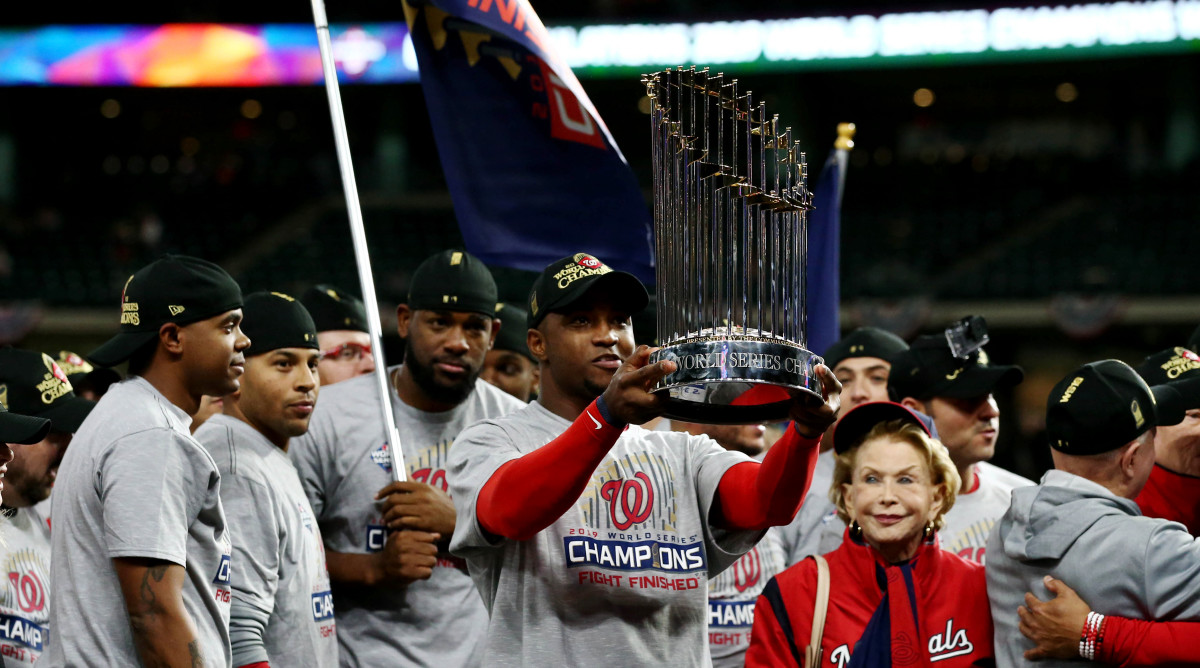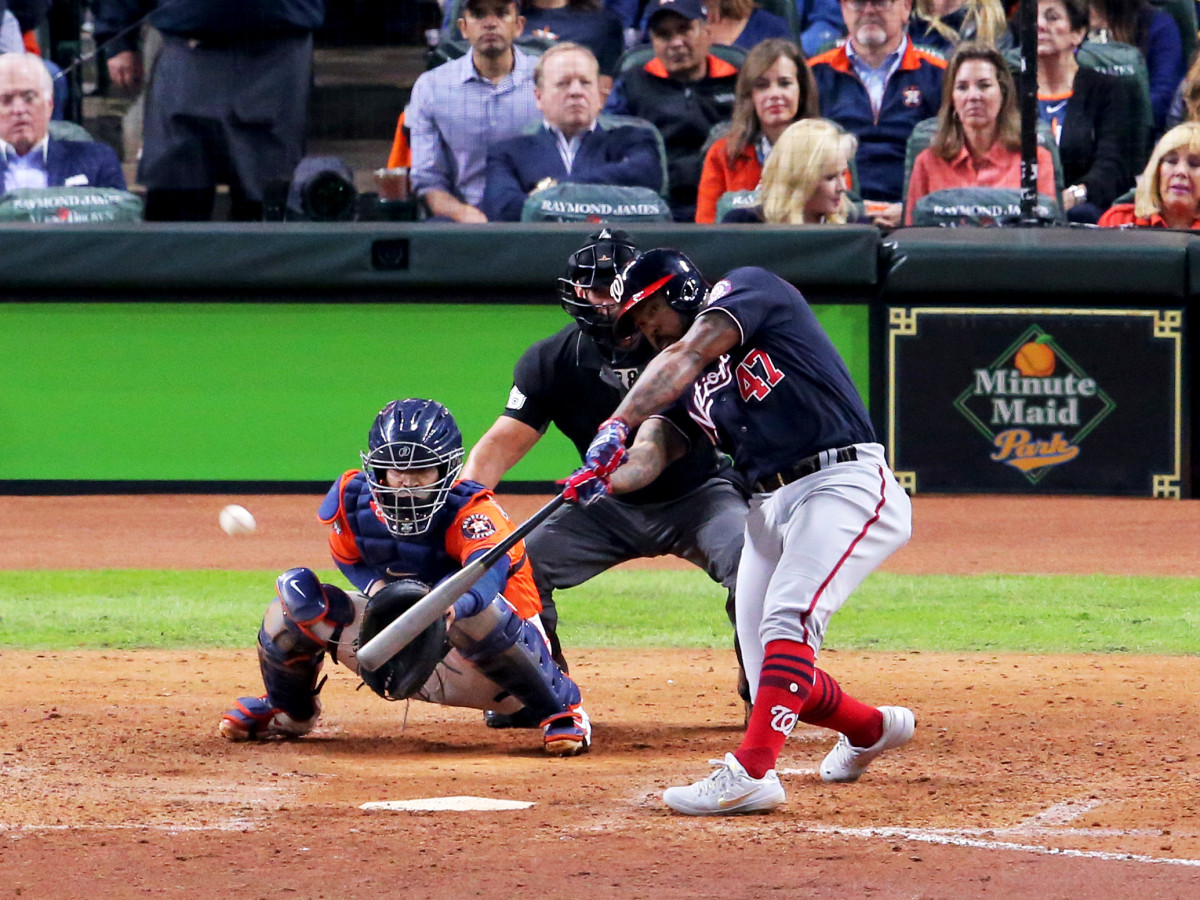'I Want Bourbon!': Nationals Let Loose After Improbable World Series Run


HOUSTON — The ball would be a seventh-inning, game-winning, championship-clinching, franchise-defining home run. It would bring Washington, D.C. its first World Series in nearly a century; it would cap one of the most unlikely postseason runs in baseball history; it would suddenly and irrevocably shift the energy in a stadium of more than 40,000. It would be not just a home run. It would be the home run. The one that gave the Nationals the lead in Game 7 of their eventual 6-2 win over the Astros Wednesday night in Houston.
But Howie Kendrick didn’t know any of that when he hit it. This was hardly a no-doubter. This was opposite field, way opposite field, toward the foul pole, perhaps all the way into foul territory. This may not have been any good at all. When Kendrick connected with the cutter from Astros reliever Will Harris—91 mph, expertly placed on the corner of the strike zone, with one out and one on in the seventh, Nationals down by one run—he did not think that he had just won the game. Kendrick thought only one thing: “Stay fair.”
As he burst out of the box toward first base, he couldn’t tell if it would or wouldn’t. Kendrick didn’t stop to look, and he didn’t wave it over, but he let the words echo inside his head with the fervor of a prayer and the rhythm of a chant: Stay fair. Stay fair. Stay fair.
It did.
“We caught a lot of breaks this year,” Ryan Zimmerman said afterward. “We caught a break. It stayed fair.”
Just by the narrowest of margins. The ball clanked off the base of the foul pole—branded by Chick-fil-A with the tagline “Burgerz R Foul.”
Kendrick’s reaction when he realized that it was fair? “I love Chick-fil-A.”
It was special, he said. “Truly special,” even. Yet it was not the greatest moment of his career. It was the 36-year-old’s first World Series, sure, in a miracle season a year after he’d been derailed by injury. But the greatest moment of his career? That would be a different home run from this October, he decided—his extra-inning grand slam from Game 5 of the National League Division Series.
“We wouldn’t be here without that,” he grinned, standing in the plastic-covered clubhouse, his teammates’ empty beer bottles and champagne corks at his feet.

• Get SI’s Washington Nationals World Series Champions commemorative issue here.
It may seem improbable that a home run like that can be anything other than the biggest moment of any career. But it is improbable for a team to be forced into five elimination games and win them all. And for a team to win four road games in the World Series. And for a team to start the season 19-31 and make it all the way to the end of October. It’s improbable for a wild-card team to take down a 107-win juggernaut that had previously been declared one of the best in the history of MLB. Yet the Nationals did all of this. They had so many wild come-from-behind moments that the go-ahead home run from Game 7 of the World Series could semi-reasonably be described as something other than the team’s most crucial one of the month. They did stuff that baseball’s never seen before. And they did it all in the frenetic, inspired, nerve-racking fashion that’s come to define the team.
“It had to end this way, right?” reliever Sean Doolittle said after Game 6. “It’s the most 2019 Nats thing ever for this to come down to a Game 7.”
His final verdict?
“This is now the most 2019 Nats thing ever,” he declared, soaking in the celebratory clubhouse environment both figuratively and literally, goggles perched on his head and lightsaber in his hand. “To be in another elimination game. To be trailing in that game in the seventh inning… That’s the 2019 Nats—to find a way.”
Their final improbable win required several smaller improbabilities of its own. It required, of course, Kendrick’s home run to stay fair. It required Max Scherzer to make it on the mound just four days after a nerve issue in his neck had left him in so much pain that he’d been unable even to dress himself. It required him to grind out five gutsy innings against a ferocious opposing lineup that hit him hard from the start. It required Houston’s Zack Greinke to falter after six frames of nearly flawless work. It required, essentially, everything to go exactly right for the Nationals. It did—which yielded its own set of improbable moments.
It yielded Stephen Strasburg, World Series MVP, an idea that had long been possible from his talent alone but seemed unlikely on a roster packed with other stars for a franchise that felt chronically incapable of winning a postseason series. It yielded owner Ted Lerner, 94 years old, born the year after D.C.’s last World Series, living finally to see another one. And it yielded Anthony Rendon, openly emotive and joyous.
“This could’ve been a spring training game for Anthony Rendon,” GM Mike Rizzo said in the clubhouse afterward, reflecting on the third baseman’s chill nature, even as he hit the home run that put the team on the board in Game 7. “When the rest of the world was losing its mind, Rendon was yawning and going deep. He’s got a slow pulse.”

• Nationals fans, get your World Series championship gear here.
That is the phrase that comes up often when discussing Rendon: slow pulse. He’s stoic, cool, dispassionate. He was clearly so throughout October, throughout the World Series, throughout Game 7, even as he continued to make crucial plays the whole time. And then it was all over, and Rendon let loose.
“I want bourbon!” he yelled as he was enveloped in a hug on the field. “I’m coming in!” as he dived into a group photo with teammates. In his hometown of Houston, where he’d grown up and played college ball, Rendon embraced friends and family, laughing and whooping and grinning. And when asked how he did it—how they did it, how this team did any of this—he had only thing to say:
“Baseball’s crazy.”
Improbable, even.
